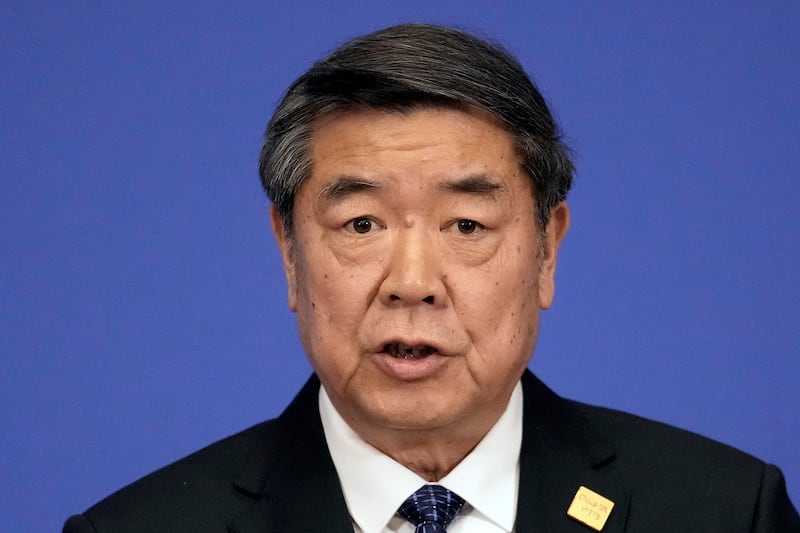WASHINGTON - U.S. Treasury Secretary Scott Bessent and Chinese Vice Premier He Lifeng discussed President Donald Trump’s plans for sweeping tariffs on Chinese imports during an introductory video call on Friday morning, according to readouts from both sides.
Trump has vowed tariffs of “more than” 60% on Chinese imports, and earlier this month began with a 10% levy on all goods from China. That led Beijing to introduce a 15% retaliatory tariff on certain U.S. energy exports to China, leading to concerns about a renewed trade war.
A brief readout from the U.S. Treasury Department said that the “introductory call” between Bessent and Lifeng had largely focused on trade, with the American side raising concerns about the U.S. trade deficit with China, which has long been a bugbear of Trump.
Bessent “expressed serious concerns about the PRC’s counternarcotics efforts, economic imbalances, and unfair policies,” the readout said, using an acronym for the People’s Republic of China.

The Treasury secretary “stressed the [Trump] Administration’s commitment to pursue trade and economic policies that protect the American economy, the American worker, and our national security,” but committed to communication with the Chinese side, it said.
According to the Chinese readout released by state news agency Xinhua, Lifeng meanwhile “expressed serious concerns over recent U.S. additional tariffs and other restrictive measures against China.”
However, both Bessent and Lifeng “recognized the significance of bilateral economic and trade relations,” the Chinese readout said.
US State Department website changes
The video call came days after the U.S. State Department updated its bilateral relations “fact sheet” on China to add a series of grievances about Beijing, leading to a backlash from the Chinese government.
The Feb. 13 changes, which themselves came days after the State Department removed previously standard language about not supporting Taiwanese independence, signaled the Trump administration’s concerns about U.S.-China trade relations.
China is “one of the most restrictive investment climates in the world” the page on U.S.-China relations now reads, before pledging to carry out Trump’s “America First” approach to trade and diplomatic ties.
“In its bilateral economic relations with China, the United States will place U.S. interests and the American people first and work to end China’s abusive, unfair, and illegal economic practices,” it says.
RELATED STORIES
Tariff war escalates: China counters US with 15% duties, Google investigation
China condemns US for tweak to Taiwan reference; Washington calls it ‘routine’ update
China condemns US tariffs, saying fentanyl is ‘America’s problem’
Beijing changes Rubio’s Chinese name, perhaps to get around travel ban
EXPLAINED: Trump’s and Harris’ differing proposals on Chinese tariffs
It also accuses Beijing of profiting off “unfair trade practices,” with the United States, including by “using forced labor and massive state subsidies, putting American businesses at a disadvantage, and making them complicit in China’s human rights abuses.”
The updated page notably also discarded the usual American diplomatic practice of referring to China’s government as “The People’s Republic of China,” or by the acronym “PRC,” rather than “China.”
“The United States is firmly committed to countering China’s licit and illicit efforts to obtain U.S. technologies to advance its military modernization,” the page says in one example passage.
‘China’ not ‘PRC’
The State Department did not respond directly to a request from Radio Free Asia to comment about the change in the name used for China’s government, but said the changes to the page in general were made to bring it in line with the priorities of the new Trump administration.
“The China fact sheet on state.gov was updated to reflect the current Administration’s policies and priorities as they relate to China and the U.S.-China relationship,” a State Department spokesperson said.
Speaking at a regular press briefing in Beijing on Thursday, Chinese Foreign Ministry spokesperson Guo Jiakun said his government “strongly deplores and firmly opposes” the tone of the new page.
“The changes made by the U.S. State Department on its ‘U.S.-China Relations’ page and ‘U.S. Relations With China’ fact sheet misrepresent the facts, attack China’s foreign policy and peddle the so-called China-U.S. strategic competition,” Guo said.
Edited by Malcolm Foster.
